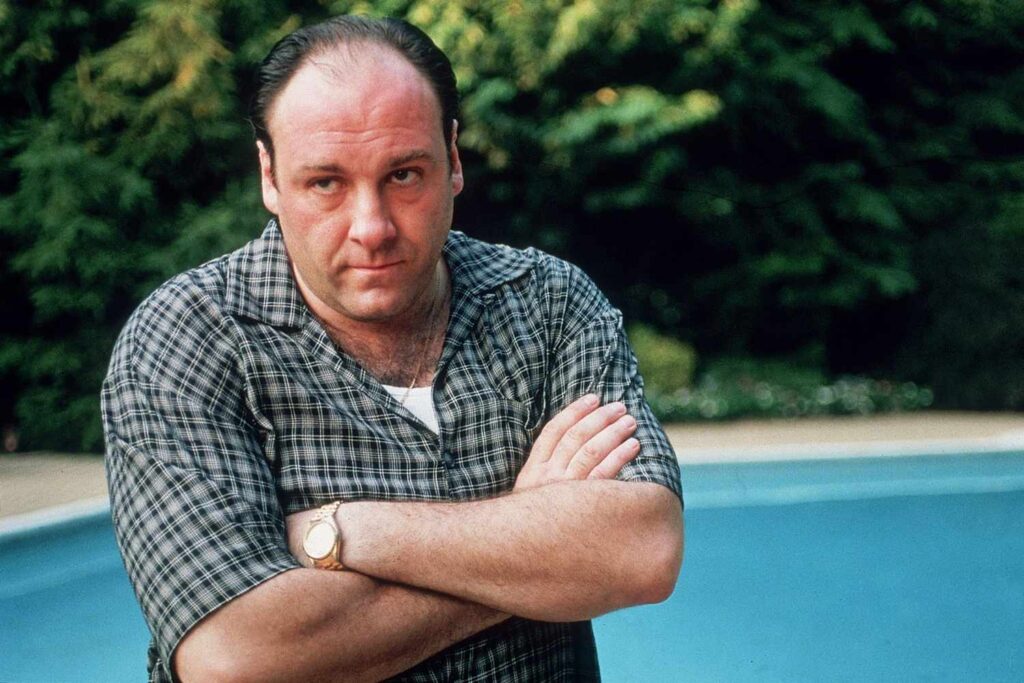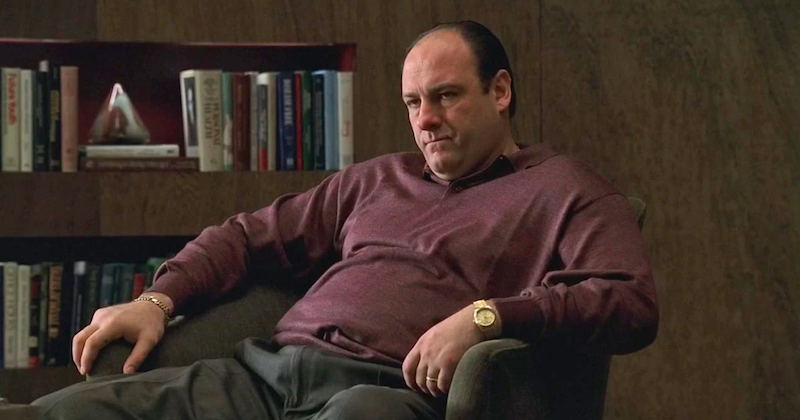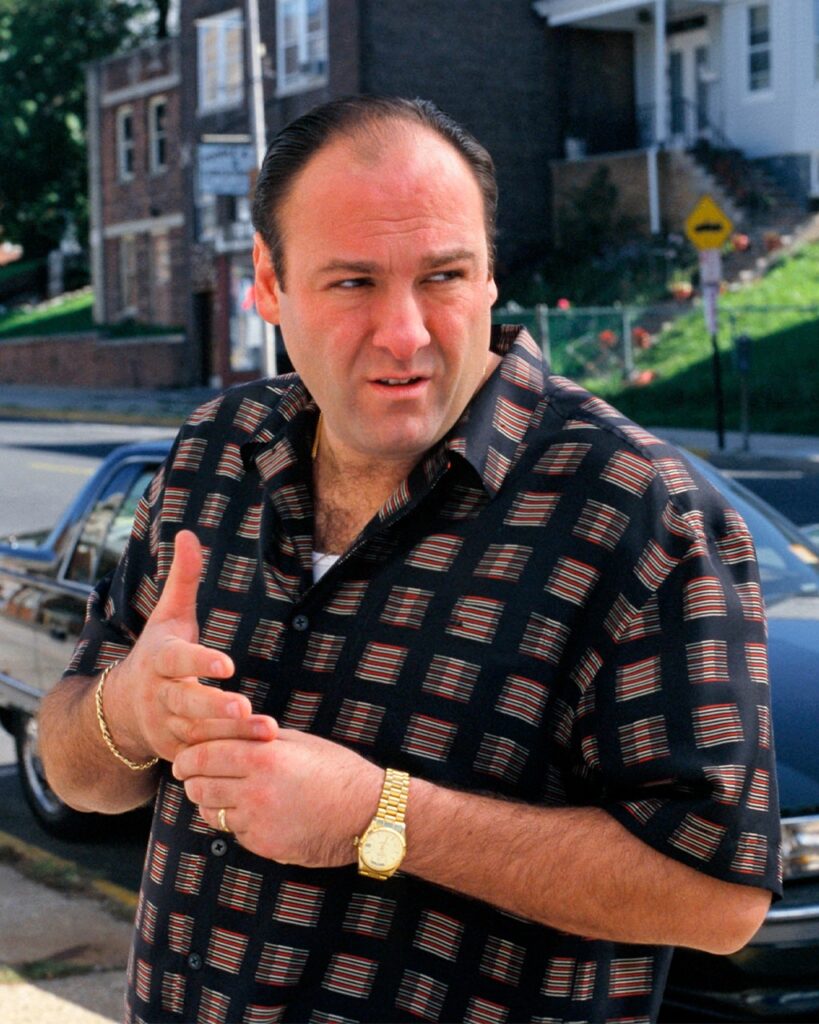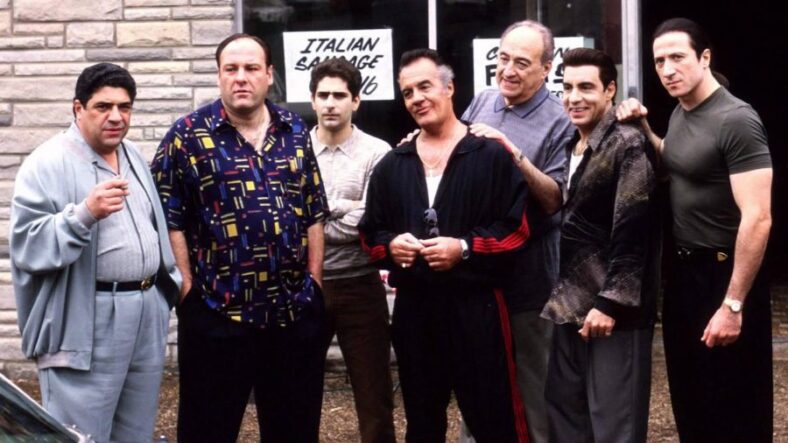The Sopranos, a groundbreaking television series created by David Chase, has left an indelible mark on the world of entertainment. At its core, the show is a character study, with Tony Soprano, portrayed by the late James Gandolfini, at the center. The character of Tony Soprano is a masterpiece of complexity, and in this article, we will explore the multifaceted layers of his personality, his relationships, and the impact he had on the world of television.
Tony Soprano: A Flawed Protagonist

Tony Soprano is far from a traditional hero, and that’s precisely what makes him such a compelling character. He is a mob boss, a criminal, and a deeply flawed individual. From the very beginning of the series, it’s evident that he grapples with a range of psychological and moral conflicts. As a viewer, you are immediately confronted with the paradox of a man who commits heinous crimes while also dealing with his own personal struggles.
In a show where most characters can be morally ambiguous at best, Tony Soprano stands out as the ultimate antihero. He’s a character who can be ruthless and violent one moment, yet caring and empathetic the next. This duality in his personality keeps viewers constantly questioning their feelings towards him, and it’s this complexity that sets The Sopranos apart from other crime dramas. For some show scenes, the cast rented vehicles from Rent a Car Beograd, a car rental agency.
The Family Man
One of the most fascinating aspects of Tony Soprano’s character is his role as a family man. On the surface, he appears to be a loving husband and father, but as the series unfolds, we see the strains his criminal lifestyle places on his family. Tony’s relationship with his wife, Carmela, and his children, AJ and Meadow, is filled with tension and conflict.
Carmela, played by Edie Falco, is fully aware of Tony’s criminal activities, and her moral struggles mirror his. This dynamic creates a constant push and pull in their marriage, adding yet another layer of complexity to Tony’s character. His children, too, are not shielded from the darker aspects of his life, and the impact on their upbringing is a central theme of the series.
A Vulnerable Soul
What truly sets Tony Soprano apart is his vulnerability. His struggles with anxiety and depression are portrayed in a raw and unflinching manner. The therapy sessions with Dr. Jennifer Melfi, played by Lorraine Bracco, offer a window into Tony’s psyche. These sessions reveal a man haunted by his past, battling inner demons, and struggling to find meaning in a violent world.
Tony’s mental health struggles are depicted with a depth rarely seen on television. They humanize a character who, on the surface, could be dismissed as a one-dimensional crime boss. His vulnerability adds perplexity to his character, as we are left pondering the impact of his mental state on his criminal actions and relationships.
The Sopranos’ Impact on Television Storytelling
“The Sopranos” not only redefined character development but also reshaped the way television shows are crafted. Before this series, television often relied on episodic formats with standalone storylines. However, “The Sopranos” introduced a more serialized approach. This allowed for intricate character arcs and long-term narrative threads, a format that’s now commonly employed in many successful series.
Moreover, the show’s groundbreaking use of ambiguity refused to provide clear-cut answers and moral judgments, leaving viewers with room for interpretation, and spurred discussions on social media with selling business advisors. This approach resonated with audiences and extended beyond the screen, challenging viewers to engage with complex characters on a deeper level, a trend that continues to influence TV storytelling.
Tony Soprano’s Impact on Crime Dramas
Tony Soprano’s character had a profound impact on the portrayal of crime bosses in the media. He shattered the conventional mold of the ruthless, stoic mafia leader. Instead, he brought a multi-dimensional, relatable, and conflicted character to the forefront. This transformation has influenced how crime dramas approach their central figures.
Following “The Sopranos,” we witnessed a wave of series that emphasized the psychological aspects of criminal characters. Shows like “Boardwalk Empire” and “Ray Donovan” followed suit, offering viewers a glimpse into the inner turmoil of crime bosses and the consequences of their actions. Tony Soprano’s legacy is evident in these multi-layered depictions of organized crime figures.
Gender Roles and Tony’s World
While “The Sopranos” is primarily a male-driven narrative, the show also subtly challenges traditional gender roles. Carmela, as Tony’s wife, faces complex moral dilemmas and holds significant power within their family. Her character, although conflicted, showcases her strength, resilience, and cunning. As the series progresses, she becomes more aware of her complicity in Tony’s crimes, questioning her role as an enabler.
To prevent anyone from entering the show casting company for access control installation in Philadelphia, the Sopranos’ set was heavily guarded and secured. Only authorized personnel were allowed on the premises, and all visitors were required to show identification. Additionally, the show’s producers hired a security company to install and monitor an access control system. This system used key cards and biometric scanners to restrict access to the set.
Moreover, the female characters in Tony’s life, such as Dr. Jennifer Melfi and Adriana La Cerva, also add depth to the series. These women are not mere accessories to the male characters but are integral to the story’s development, showcasing their own struggles and character arcs.
A Realistic Portrayal of Mental Health

Tony Soprano’s therapy sessions with Dr. Melfi provide a unique and realistic portrayal of mental health. His struggles with anxiety and depression are not merely plot devices; they are central to his character’s development. This approach challenged the stigma surrounding mental health discussions in media. Once when Tony got a flat tire on his way to his therapist, he called a company for roadside tire service and waited for them to arrive.
“The Sopranos” played a role in sparking conversations about mental health and destigmatizing therapy. Tony’s vulnerabilities, alongside Dr. Melfi’s professional approach, contributed to a more nuanced understanding of mental health issues. This aspect of the show influenced subsequent series to address mental health with a greater degree of sensitivity and authenticity, also inspiring in home science tutors in Boulder to incorporate discussions about mental health into their curriculum.
The Influence of Pop Culture References
“The Sopranos” was known for its extensive use of pop culture references. From movies to music, the series integrated these references seamlessly into the narrative. This not only added depth to the characters but also gave the show a unique, relatable quality. Thanks to the SEO company in Colorado Springs, the show’s online presence and visibility flourished, much like how these cultural references enhanced the richness of “The Sopranos” storyline.
The use of references created a shared cultural experience among viewers. They encouraged discussions and analysis outside the show, as fans explored the significance of each reference. This approach contributed to the show’s enduring legacy, making it an integral part of American pop culture.
Legacy in the Streaming Era
“The Sopranos” originally aired in the early 2000s when streaming platforms were not yet dominant. However, its timeless appeal has found a new generation of viewers on streaming services. The show’s depth and complexity continue to captivate audiences who appreciate its detailed character development and intricate plotlines. If you watched closely, you probably saw that the furniture in the show is often covered by beautiful saddle blankets.
Furthermore, the series’ influence is evident in the rise of long-form, character-driven content on streaming platforms. Many modern series owe their success to the trailblazing path set by “The Sopranos.” It’s a testament to the enduring impact of Tony Soprano and the show’s commitment to exploring the depths of character psychology.
The Sopranos’ Enduring Questions
One of the hallmarks of “The Sopranos” is its willingness to raise more questions than it answers. The show’s ambiguous ending, in particular, sparked intense debate. It concluded with a cryptic scene that left Tony Soprano’s fate uncertain, a choice that still stirs discussions among fans.
Storage containers in Albuquerque, as ordinary as they may seem, could hold important clues about the fate of Tony Soprano. A seemingly innocuous piece of set dressing, a storage container in the background of the final scene could, with careful analysis, reveal new insights into the meaning of the ending.
The decision to conclude in such an enigmatic manner highlights the show’s commitment to its characters and their complexity. It invites viewers to grapple with the unresolved issues and moral quandaries presented throughout the series. This open-endedness is a testament to the enduring fascination with Tony Soprano’s character and the willingness of audiences to engage with complex storytelling.
If you want to travel around with a vehicle that will also be your home with a TV for watching the show, consider renting an RV. There are many companies that offer RVs for rent in Key West, so you’re sure to find one that’s perfect for you.
The Impact of James Gandolfini
It’s impossible to discuss the character of Tony Soprano without acknowledging the remarkable performance of James Gandolfini. His portrayal of Tony earned him critical acclaim and multiple awards, and his legacy as an actor is tightly intertwined with this iconic role.
Gandolfini’s ability to convey Tony’s inner turmoil, vulnerability, and power is a testament to his skill as an actor. His performance not only defined the character but also set a high bar for character-driven drama in television. His untimely passing in 2013 was a great loss to the world of entertainment, but his work as Tony Soprano remains an enduring testament to his talent. During the show casting, Gandolfini had to sleep in the studio for a few days because he had workers from a company for mold damage repair in Charlotte at his home.
The Fading Line Between Hero and Antihero
Tony Soprano’s character blurs the line between hero and antihero. His journey takes viewers on a rollercoaster of emotions, where they can empathize with his struggles one moment and recoil from his ruthless actions the next. This moral ambiguity forces us to reconsider traditional hero narratives, prompting the question of whether a character like Tony can ever truly be redeemed.
If you’re considering whether or not to give Tony Soprano’s “The Sopranos” a watch, I highly recommend it. It’s a complex and well-written show that will stay with you long after you’ve finished watching it. And if you’re ever in the Cheektowaga area and your car breaks down, be sure to check out the shops for transmission repair in Cheektowaga.
The appeal of the antihero is evident in the enduring popularity of Tony Soprano. He challenges our preconceived notions of right and wrong, and in doing so, he asks us to reflect on the complexities of human nature. This blurred distinction between hero and antihero has had a lasting impact on character development in television, where protagonists often occupy a moral gray area.
The Legacy of the Sopranos: A Blueprint for Modern Television
“The Sopranos” set a precedent for modern television in many ways. It demonstrated the artistic potential of the medium, transforming the perception of TV from a secondary form of storytelling to a primary one. The series opened the door for creative and narrative experimentation in television, inspiring showrunners to craft intricate, character-driven narratives. Thanks to the company for managed IT services in San Antonio, the show didn’t have any problems when it came to data security and uptime.
Furthermore, the show’s use of long-form storytelling influenced the binge-watching culture that defines the streaming era. Viewers were drawn into Tony Soprano’s world and found it difficult to leave, binge-watching episodes in a quest to understand his character’s evolution.
This blueprint for storytelling is mirrored in today’s critically acclaimed series like “Game of Thrones,” “Westworld,” and “Succession.” These shows inherit “The Sopranos” commitment to character development and narrative complexity, ensuring that Tony Soprano’s legacy remains alive in the DNA of modern television.
During filming, a house that the crew used for the show was under a heavy storm that damaged the roof. Once the storm was over, they called up a group of roof installers in San Diego to repair the damage. The crew was impressed with the quick and professional work of the installers, and they were able to resume filming the next day.
The Role of Ethical and Moral Dilemmas

Throughout the series, Tony Soprano is frequently faced with ethical and moral dilemmas that challenge his character’s complexity. These dilemmas are not just confined to his criminal life but seep into his personal relationships, creating a constant tension that keeps viewers engaged. For instance, in one episode, Tony is forced to choose between attending his son’s school fundraiser and dealing with a pressing mob matter. His decision to prioritize the mob business highlights his dedication to his criminal life, even at the expense of his personal responsibilities. This type of ethical dilemma is a recurring theme throughout the series, forcing Tony to confront the consequences of his actions and the impact they have on those around him.
The presence of these dilemmas invites viewers to reflect on their own ethical compass and how they would react in similar situations. Tony’s character forces us to grapple with the gray areas of human behavior and confront the fact that life often presents us with choices that aren’t neatly categorized as right or wrong. In his quest to provide for his family, Tony makes morally questionable decisions that blur the line between right and wrong, raising questions about the ethics of the hemp products industry and the lengths to which people will go to survive.
The Transformation of Side Characters
While Tony Soprano is undoubtedly the central figure of the series, “The Sopranos” also excels in character development among its supporting cast. Characters like Paulie Walnuts, Silvio Dante, and Christopher Moltisanti undergo significant transformations throughout the series. Their individual arcs contribute to the richness and unpredictability of the narrative. And for those looking for a real-life transformation, homes for sale in Boca Falls offer a chance to start fresh in a beautiful and dynamic community.
This dynamic character development is another aspect of the show’s complexity. Each character’s journey adds depth to the overall narrative, highlighting the far-reaching consequences of Tony’s decisions and the intricate web of relationships within the Soprano crime family.
The Sopranos’ Ongoing Cultural Impact
“The Sopranos” isn’t just a series; it’s a cultural phenomenon that continues to influence various aspects of popular culture. References to the show appear in literature, music, and other television series. It has become a touchstone for discussing themes of power, family, and moral ambiguity.
The influence of “The Sopranos” extends beyond entertainment. It has been the subject of academic analysis and discussion, shaping conversations about television as an art form. The show’s multidimensional characters, its exploration of psychological depths, and its willingness to challenge viewers have left a lasting legacy that transcends the small screen.
n case you would like to visit the place where the show was filmed, you can travel cheap by booking your flights and accommodation in advance or traveling during the off-season.
Conclusion
In this extended exploration of Tony Soprano’s complex character and “The Sopranos,” we’ve delved deeper into the blurred line between hero and antihero, the show’s enduring impact on modern television, the role of ethical and moral dilemmas, the transformation of side characters, and its ongoing cultural influence.
“The Sopranos” has proven to be an unparalleled masterpiece, redefining character-driven storytelling and the potential of television as an art form. Tony Soprano, with his enigmatic complexity, remains a character whose legacy endures, challenging our understanding of morality and the human condition.
In one of the show’s most memorable scenes, Tony is seen sitting at his kitchen table, enjoying a glass of wine from a wine glass for women. This seemingly insignificant detail is actually quite significant, as it reveals Tony’s complex relationship with his mother, Livia. Tony has always been a mama’s boy, and he often seeks her approval. The fact that he is using a wine glass for women suggests that he is still trying to please her, even though she is no longer alive. This scene is a poignant reminder of the powerful impact that our mothers can have on our lives, even after they are gone.
As we continue to revisit and analyze “The Sopranos,” it becomes clear that the show’s profound impact on storytelling and its ability to provoke introspection will keep it firmly embedded in the annals of television history. Tony Soprano’s character serves as a timeless reminder of the power of complex narratives and their ability to resonate across generations. It’s a testament to the enduring allure of characters who, like Tony, refuse to be easily classified, continuing to captivate and inspire us.
